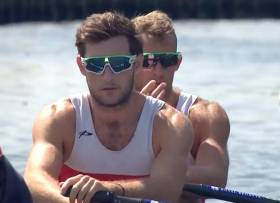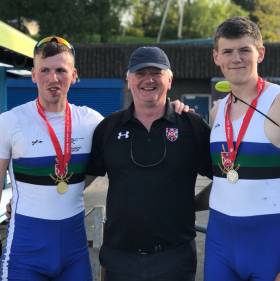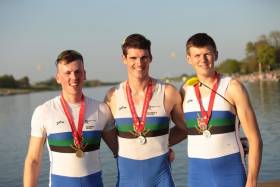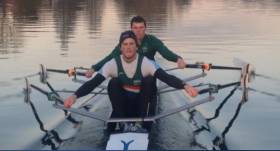Displaying items by tag: Tiernan Oliver
#Rowing: Paul O’Donovan and Gary O’Donovan won their first race at Henley Royal Regatta with plenty to spare. The Skibbereen double scull sprinted away from Leander’s Stephen Cox and Tiernan Oliver at the start and left them well behind for the rest of the contest. The winning marging was a quarter length shy of five lengths.
Henley Royal Regatta, Day Three (Irish interest; selected results)
Thames Cup (Eights, club): Montclair Mounties, United States bt Cork Boat Club ¾l .
Prince Albert (Fours, coxed; Student): Columbia University, US bt NUIG 1¾ l.
Double Sculls (Open): G O’Donovan, P O’Donovan bt S Cox, T Oliver 4¾ l.
Gold for Queen's University at BUCS Rowing Regatta
#Rowing: Queen’s University won the Championships Quadruple at the BUCS Regatta in Nottingham today. The crew of Nathan Hull, Sam McKeown, Philip Doyle and Tiernan Oliver beat Reading into second and Oxford Brookes into third. The Queen’s women’s Beginners’ eight took silver in their race.
BUCS Regatta, Nottingham (Selected Results; Irish interest)
Men
Sculling, Quadruple – Championship: 1 Queen’s (N Hull, S McKeown, P Doyle, T Oliver) 6:05.57, 2 Reading 6:08.22, 3 Oxford Brookes 6:10.22.
Women
Eight – Beginners’: 1 Edinburgh 7:15.28, 2 Queen’s 7:24.25.
Queen's in the Medals at BUCS Rowing Regatta
#Rowing: Queen’s University, Belfast, launched a very successful raid on the medals available on the first two days of the BUCS Regatta in Nottingham.
Queen’s had a very successful Saturday. They won the Beginners’ coxed four, and their talented group of scullers also shone. Philip Doyle took silver in the Championship single, while Sam McKeown took fourth. In the intermediate single, Queen’s took gold and silver, through Tiernan Oliver and Nathan Hull.
This foursome were again on song on Sunday. McKeown and Doyle took silver in the Championship double, and Hull and Oliver matched them. Fiona Bell also made the podium in the women’s Championship single scull, taking bronze.
BUCS (British University) Regatta, Nottingham (Selected Results; Irish interest)
Saturday
Men, Four – Beginners’, coxed: 1 Queen’s 7:10.49.
Sculling, Single – Championship: 1 Edinburgh (J Armstrong) 7:20.99, 2 Queen’s (P Doyle) 7:22.01; 4 Queen’s (S McKeown) 7:27.73. Intermediate: 1 Queen’s (T Oliver) 7:37.48, 2 Queen’s (N Hull) 7:37.66.
Sunday
Men, Sculling, Double – Championship: 1 Reading 6:40.76, 2 Queen’s 6:43.56. Inter: 1 Reading 6:55.04, 2 Queen’s 7:00.91.
Women
Sculling, Single – Championship: 1 Edinburgh 8:09.20; 3 Queen’s 8:26.50.
Lightweight Queen's Crew Fastest at Shannon Rowing
#Rowing: A young Queen’s University lightweight quadruple were the fastest crew at the Shannon Head of the River at Carrick-on-Shannon on Saturday. The under-23 crew of Jordan Wilson, Miles Taylor, Ewan Murray and Harry Mahon took 11 minutes and 53 seconds to complete the course. Portora’s junior 16 eight also did well. Tiernan Oliver and Sam McKeown, in a senior double, almost matched their time. See Attached Results.
Head of the Shannon, Carrick-on-Shannon (Selected Results)
Head One:
Men
Eight – Jun 16: Portora 12 minutes 43 seconds.
Four – Jun 18, coxed: Portora 13:13.
Sculling, Quadruple – Jun 16, coxed: Carrick-on-Shannon 14:24. Double – Sen: Queen’s 12:46
Women
Eight – Club One: Commercial 14:29. Jun 18: Commercial 13:39
Sculling, Quadruple – Jun 18A: Portora 14:08.
Head Two:
Men
Eight – Novice: Commercial 14:55.
Sculling – Quadruple – Sen: Queen’s 11:53. Jun 18A, coxed: Portora 12:28
Single – Sen: Queen’s (T Oliver) 14:03. Jun 18A Carrick-on-Shannon (T Earley) 14:48.
Women
Eight – Inter: Commercial B 13:40. Jun 16: Portora 13:57.
































































